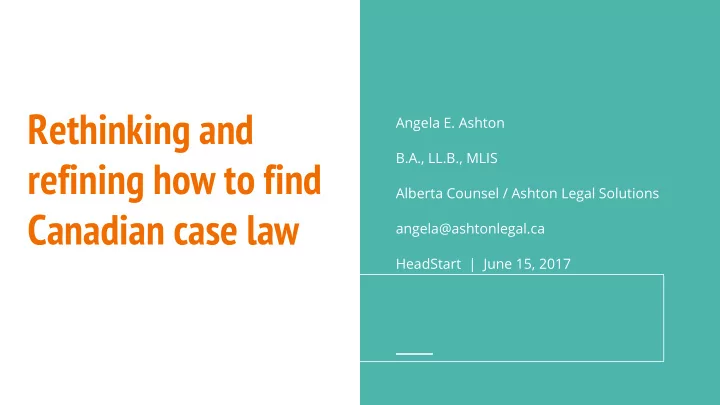

Rethinking and Angela E. Ashton B.A., LL.B., MLIS refining how to find Alberta Counsel / Ashton Legal Solutions Canadian case law angela@ashtonlegal.ca HeadStart | June 15, 2017 Ashton, LL.B., MLIS, y smart person)
Outline Introduction When you know nothing / a little How lawyers seek information When to stop The information gap Exercise - Slapshot! Sources of case law Discussion Refining your search skills Questions Where do I begin?
“Mastering the existing tools to identify the most relevant and binding or persuasive case law is a key factor in becoming a good legal researcher.” McCormack, Papadopoulos & Cotter. 2015. The Practical Guide to Canadian Legal Research, 4th Edition. Carswell. Toronto: ON.
How lawyers seek information How lawyers seek information depends on: their organization context (big or small firm, resources at their disposal), ● their experience (number of years of practice), ● their comfort with technology, ● what type of source they are consulting (formal or informal), ● what type of task or role in which they are involved (advising client or ● administrative work) and what type of information resources to which they have access. ● Leckie, G. J., Pettigrew, K. E., & Sylvain, C. (1996). Modeling the information seeking of professionals: a general model derived from research on engineers, health care professionals, and lawyers. Library Quarterly , 66, 161-193.
The information gap “Law schools do not fully prepare lawyers for the information gap they face in practice, because the problems which law students are required to solve in law school were not the same as, or substantially similar to, the real world problems that greeted them in the practice of law.” Lee, J. (2011). Legal Information Metamorphosing Law Students into Legal Professions Based on Empirical Evidence of Attorney's Information Seeking Behavior [article]. International Journal Of Legal Information , (1), 1.
Sources of case law (primary sources) The two main commercial online services for Canadian case law are: Westlaw Next Canada ● LexisNexis Quicklaw ● The best known non-commercial website is the Canadian Legal Information Institute (CanLII), along with court websites. Don’t forget Law Reports The Practical Guide to Canadian Legal Research, 4th Edition. (2015). McCormack, Papadopoulos & Cotter. Carswell. Toronto: ON.
Refining your search skills You know how to find case law. But are you finding it efficiently? Words and phrases research Words & Phrases (LawSource/Westlaw) ● Canadian Legal Words & Phrases (Quicklaw) ● Boolean operators and filters Search syntax handout (Canadian Legal Writing and Research Guide) ●
When you know nothing
Beware the immediate keyword search
Where do I begin? Start with a secondary source such as an encyclopedic digest: Canadian Encyclopedic Digest (Westlaw) ● Halsbury’s Laws of Canada (Quicklaw) ● Or a case law digest such as The Canadian Abridgement Case Digests (Westlaw) . The Practical Guide to Canadian Legal Research, 4th Edition. (2015). McCormack, Papadopoulos & Cotter. Carswell, Toronto: ON.
When you know a little Narrow search terms / subject headings / words and phrases search ● Consult an annotation ● Note-up leading cases ● KeyCite in Westlaw ○ QuickCITE in Quicklaw ○ Canadian Case Citation in the Canadian Abridgement ○ CanLII has a note up service, but it lacks the breadth and depth of commercial databases, ○ so you won’t find as many cases.
When you think you know everything
When to stop Satisficing (good enough to meet your objectives) vs. exhaustive search ● When you are running out of time ● “When you keep coming across the same material, but nothing new ● shows up” ( Canadian Legal Research and Writing Guide) The Canadian Legal Research and Writing Guide : http://legalresearch.org
Can we ever stop? “The current information environment is rich, characterized by a proliferation of information sources and providers, a multiplicity of methods for accessing information, and a redundancy of content from multiple sources. In this “overloaded” information environment, many information users tend to to experience a sense of information inadequacy and anxiety. ” Prabha, Chandra, Lynn Silipigni Connaway, Lawrence Olszewski, and Lillie R. Jenkins. 2007. “What is enough? Satisficing information needs.” Journal of Documentation, 63,1: 74-89.
Comparing Westlaw, Quicklaw and CanLII
Exercise - Slapshot!
Memo from Partner Underling: I just rewatched Slapshot! and am wondering if there is any case law dealing with assault in sports. Tell me what you find. You have half an hour. Skip lunch. Kind regards, Evil Overlord Partner
Discussion What search terms did you start with? What boolean operators did you use? What was the search string that garnered the best results? How did you filter out unwanted cases? How did you decide when to stop?
Questions?
Bibliography Leckie, G. J., Pettigrew, K. E., & Sylvain, C. (1996). Modeling the information seeking of professionals: a general model derived from research on engineers, health care professionals, and lawyers. Library Quarterly , 66, 161-193. McCormack, Papadopoulos & Cotter. 2015. The Practical Guide to Canadian Legal Research, 4th Edition. Carswell. Toronto: ON. Prabha, Chandra, Lynn Silipigni Connaway, Lawrence Olszewski, and Lillie R. Jenkins. 2007. “What is enough? Satisficing information needs.” Journal of Documentation, 63,1: 74-89.
Recommend
More recommend